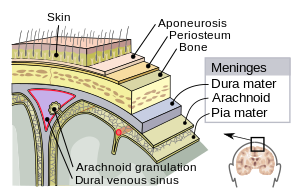Cerebral meningitis
| Meningitis | |
|---|---|
 |
|
| Meninges of the central nervous system: dura mater, arachnoid mater, and pia mater. | |
| Specialty | Infectious disease, neurology |
| Symptoms | Fever, headache, neck stiffness |
| Complications | Deafness, epilepsy, hydrocephalus, cognitive deficits |
| Causes | Viral, bacterial, other |
| Diagnostic method | Lumbar puncture |
| Similar conditions | Brain tumor, lupus, Lyme disease, seizures, neuroleptic malignant syndrome,naegleriasis |
| Prevention | Vaccination |
| Medication | Antibiotics, antivirals, steroids |
| Frequency | 8.7 million (2015) |
| Deaths | 379,000 (2015) |
| Classification |
· ·
|
|---|---|
| External resources |
Meningitis is an acute inflammation of the protective membranes covering the brain and spinal cord, known collectively as the meninges. The most common symptoms are fever, headache, and neck stiffness. Other symptoms include confusion or altered consciousness, vomiting, and an inability to tolerate light or loud noises. Young children often exhibit only nonspecific symptoms, such as irritability, drowsiness, or poor feeding. If a rash is present, it may indicate a particular cause of meningitis; for instance, meningitis caused by meningococcal bacteria may be accompanied by a characteristic rash.
The inflammation may be caused by infection with viruses, bacteria, or other microorganisms, and less commonly by certain drugs. Meningitis can be life-threatening because of the inflammation's proximity to the brain and spinal cord; therefore, the condition is classified as a medical emergency. A lumbar puncture can diagnose or exclude meningitis. A needle is inserted into the spinal canal to collect a sample of cerebrospinal fluid (CSF), that envelops the brain and spinal cord. The CSF is examined in a medical laboratory.
Some forms of meningitis are preventable by immunization with the meningococcal, mumps, pneumococcal, and Hib vaccines. Giving antibiotics to people with significant exposure to certain types of meningitis may also be useful. The first treatment in acute meningitis consists of promptly giving antibiotics and sometimes antiviral drugs.Corticosteroids can also be used to prevent complications from excessive inflammation. Meningitis can lead to serious long-term consequences such as deafness, epilepsy, hydrocephalus, or cognitive deficits, especially if not treated quickly.
...
Wikipedia
